#nicolas flamel
Text
nicolas flamel has undoubtedly the best walk

i mean look at him go
GO LITTLE ROCKSTAR!
the man
the myth
the legend
#harry potter series#harry potter headcanon#fantastic beats and where to find them#fantastic beasts#newt scamander#nicolas flamel#the sources stone#the philosopher's stone#harry potter#harry potter incorrect quotes#marauders#marauders fandom#the marauders#ao3#sirius black#wizarding world#dead gay wizards#remus lupin#hp fandom#james potter#hogwarts#gellert grindleward#albus dumbledore#minerva mcgonagall#minnie#go little rockstar#walk this way
272 notes
·
View notes
Text

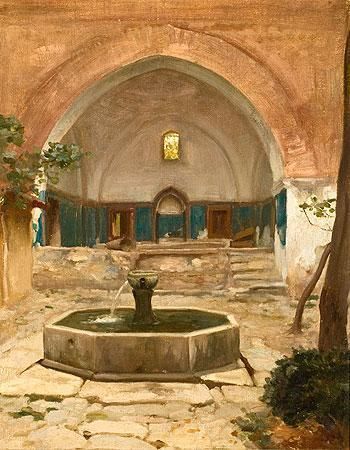
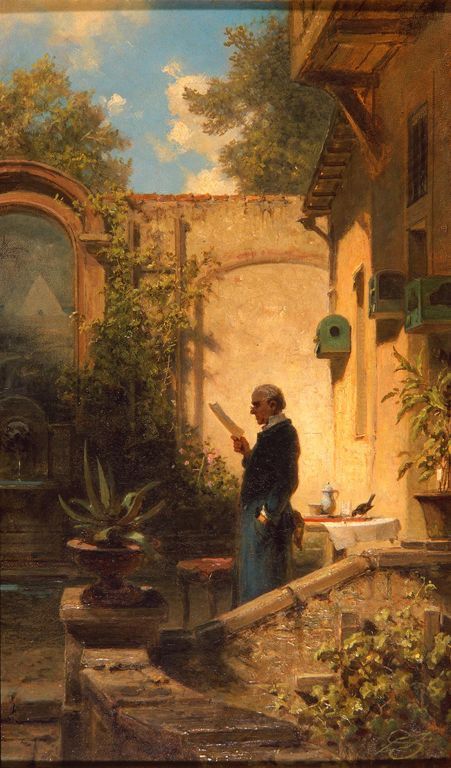

— Aesthetic: The Nicolas and Perenelle Flamel Fountain —
"The Nicolas and Perenelle Flamel Fountain was a magnificent fountain in the middle of the park of the Palace of Beauxbatons. Its waters were believed to have healing and beautifying properties.
The fountain was named after Nicolas and Perenelle Flamel, who part-funded the château and grounds of Beauxbatons Academy of Magic, with alchemist gold." — About the school grounds.
24 notes
·
View notes
Text
thereaderarchive reads PS (4)

I CAN'T BELIEVE ALBUS DUMBLEDORE WAS CANOODLING WITH NICOLAS FLAMEL WHILE HIS HUSBAND WAS IN JAIL!

You were supposed to be sad! Crying into your phoenix's shoulder (?), not getting an older, successful new boyfriend! With dragons and alchemy! What about Gellert, huh? The blood pact meant nothing to you? We all know you see him in the mirror!
And yes, I'll be reading into every little thing, especially if it's gay and not canon.
#grindeldore#dumbledore#nicolas flamel#flameldore?#thereaderarchive reads ps#the person who said dumbledore was a brag bottom was right i bring further proof
34 notes
·
View notes
Text
What if Nicolas Flamel became a witch??
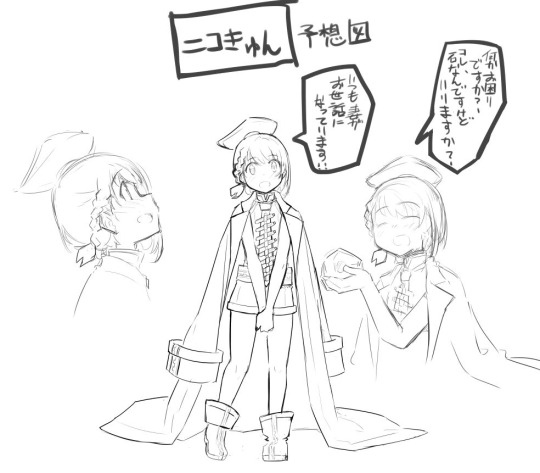
I mean, Flamel is already pretty much magi-coded, why not take it one step further?
PRIMO MATERIA

The witch of the philosopher's stone, its nature is biological immortality. It has the ability to manipulate the chemical structure of anything from metal to human flesh, and change it to whatever it pleases. Its apparent intelligence fluctuates from of a wise genius to only a clingy baby.
The doppel of biological immortality, its form is a philosopher's stone.
Each of its segments are in the shape of one of the five alchemical polygon going in numerical order, with the icosahedron containing the witch, which has aged so far backwards from the philosopher's stone's magic, its now a fetus, using its treasured stone as a womb.
I'd imagine if Flamel was a magi (and therefore magireco unit), he'd have a trio unit with Pernelle (with Torte as the third wheel), and combine with Hermes Trismegistus and Torte's doppel.
6 notes
·
View notes
Text
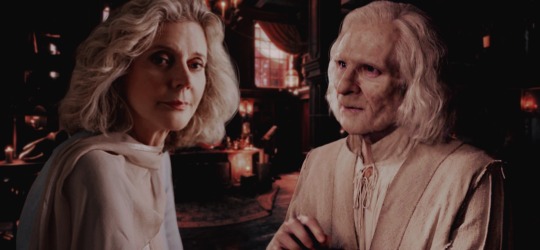

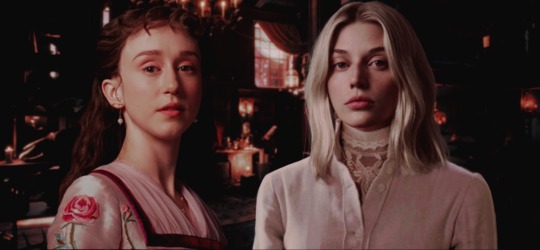
THE ALCHEMISTS | HP VICTORIAN ERA
—
Perenelle Flamel - Alchemist (Mentor)
➔ portrayed by Blythe Danner
Nicolas Flamel - Alchemist (Mentor)
➔ portrayed by Brontis Jodorowsky
Delilah Sweets @usernoneexistent - Alchemist (Mentee?)
➔ portrayed by Taissa Farmiga
Violette Durand - Alchemist (Mentee)
➔ portrayed by Nora O’Neil
—
Violette and Delilah met each other at Hogwarts after transferring from their respective Wizarding Schools. They share their dream to pave the way for women in the field of Alchemy and spend a lot of their time working together in the Alchemy lab, both at Hogwarts and after their graduation. While Violette obtains an apprenticeship with the Flamels, Delilah, later, unites with Perenelle to write and update Alchemy textbooks.
#felt like doing something for Vio (and Delilah because she was raving about her so sweetly to Winona 💕)#perenelle flamel#nicolas flamel#delilah sweets#violette durand#hp alchemists#hp victorian era#hphl#I guess it’s technically Edwardian era but oh well#my edits
14 notes
·
View notes
Text

im smoking the shit that made the philosophers stoned
7 notes
·
View notes
Text
Book of the Day - Alchemy: Science of the Cosmos, Science of the Soul
Book of the Day – Alchemy: Science of the Cosmos, Science of the Soul
Today’s Book of the Day is Alchemy: Science of the Cosmos, Science of the Soul written by Titus Burckhardt and published in 1997 by Fons Vitae (the book was originally published in 1960, in German, under the title Alchemie, Sinn- und Weltbild).
Eminent Swiss metaphysician and scholar Dr. Titus Burckhardt (1908 – 1984) was an expert and a leading member of the Perennialist or Traditionalist…

View On WordPress
#Alchemical Marriage#Alchemy#Alchemy of Prayer#Alchemy: Science of the Cosmos#Ananda Coomaraswamy#Calcination#Coagulation#Conjunction#Dissolution#Distillation#Emerald Tablet#Fermentation#Harry Oldmeadow#Huston Smith#Jean-Louis Michon#Marco Pallis#Martin Lings#Materia Prima#Nicolas Flamel#Raffaello Palandri#Raffaello Palandri Alchemy#René Guénon#Science of the Soul#Separation#Seven Stages#Seyyed Hossein Nasr#soul#Spirit#Sufism#Titus Burckhardt
13 notes
·
View notes
Text
Why had no one made the correlation that Nicolas Flamel could very well be merlin? Like the man creates a stone to live forever! More likely he was stuck immortal and was tired of creating fake aliases while he wanted for Arthur's return. And it's very well possible that Harry was a reincarnation of Arthur, as the "chosen one set to unite the kingdom" and conveniently Flamel dies when Harry finally takes his place as the chosen one.
#harry potter#nicolas flamel#bbc merlin#merlin#arthur x merlin#arthurian legend#prince arthur#harry james potter#harry potter is arthur pendragon#arthur pendragon
3 notes
·
View notes
Text
we don’t know a whole lot about what Albus and Nicolas Flamel went through to “create” the Philosopher’s Stone together in HP canon so like... what if Nicolas and Perenelle had two apprentices 👀
#fireandgold#fireandgoldposts#time travel harrydore#Albus Dumbledore#Harry Potter#Nicolas Flamel#or think: Nicolas and Albus are puttering along and one day Perenelle comes in with this waif like ''he's my apprentice now''#and Albus starts off being jealous that he's not the center of attention but like... new guy's kinda fit#Harry doesn't know shit about alchemy but is Doing His Best#bonus points for convenient amnesia
5 notes
·
View notes
Text
Magical summer: Nicolas Flamel
NICOLAS FLAMEL
Category: Real-life / French legends
Today, thanks to Harry Potter, everybody knows about Nicolas Flamel. But who was he really? An alchemist you say? Well the truth is a bit more complicated…
I) The real-life Nicolas
In real-life, Nicolas Flamel did exist, but he was not an alchemist – though his lifestory did inspire his alchemist legend.
Nicolas Flamel was born probably around 1340 (or in 1330). He escaped the Black Plague in his youth and spent his life in Paris, in a war-torn France. Nicolas Flamel was a bourgeois who made a career out of being a scribe, public writer and book-seller. Around 1370 he married a wealthy widow named Perenelle (who had gotten her fortune due to surviving two previous husbands). They never had any children but they were very generous with their wealth and great philanthropist : they notably helped or commissioned the building or repairing of numerous religions buildings and places. Perenelle died in 1397, and there was a big trial because in her will she had left all her money to her husband, but Perenelle’s sister and brother-in-law wanted the money (spoiler, they ended up obtaining it). But Nicolas still kept active, continued giving money to pious businesses, and also involved himself in property investment and real estate speculation. Churches, arcades, chapels, cemeteries, houses for the poor: he built a LOT of things across Paris, resulting in his name or statue popping up on many corners of the cities. He also owned numerous houses both in Paris and in its countryside (though we know he had abandoned some of them and left them to ruin). We know that these real estate investments might have greatly helped his fortune, given they were made in the context of an economic depression caused by the Hundred Years War.
Nicolas Flamel died in 1418 (he was in his seventies, which was quite old for the time), and was buried in the church “Saint-Jacques-la-Boucherie” (Saint-Jack-the-Butcher), with a tombstone he had designed himself eight years prior. However the church was destroyed at the end of the French Revolution, and the bones of Nicolas and his wife sent to the Catacombs of Paris. His tombstone can still be seen today, at the Musée de Cluny, and his last house still stands today. It is one of the oldest buildings of Paris, built in 1407!
And so that was the life if Nicolas Flamel… Who was not an alchemist or an occultist of any kind. Just a regular, kind and generous, pious bourgeois. But you see, the thing is that after his death, people started to talk… We know he was rich, but he wasn’t the richest guy of Paris, far from it, he just had a very comfortable way of living. Yet, given all his donations to help build or repair buildings, people seeing all the houses he owned and how his name seemed on so many buildings… They started to say he was even wealthier than he truly was. Rumor said he was filthy rich, mysteriously rich… and this coupled with his status as an educated scholar dabbling with books and writings of all sorts… PLUS the fact he lived to quite an old age for the time, and had planned his own death in advance… all of this was highly suspicious and soon people started to say… “Hey, wasn’t he an alchemist?”
II) What’s an alchemist?
If you don’t know about it, alchemy was a real science and art back in the medieval and Renaissance Europe. There’s a lot of false ideas and concepts going around, so let’s summarize it… Alchemy was actually the ancestor of chemistry. It was in truth a form of science, a prototype of modern science, which touched upon matters of chemistry, physics and astronomy. But it was an occult form of science, influenced by religious thinking, mystic philosophies and ancient cosmogonies. As a result for example, they studied the properties of the different stones and metals, and discovered a lot of useful things about how metal works, how they melt, how they change and can poison or heal people. But they also believed for example that metals corresponded to different planets or stars in the sky, or that materials could be influenced by the day of the year, and they still held the theory of the “four elements” as the right breakdown of the universe. This philosophical and occult point of view tended to make people discredit alchemist as just “kooky wizards and crazy experimenters”, especially due to how alchemists like to kept their work and experiments secrets by using hidden messages, allegories, metaphors and other coded writing, resulting in their treaties and texts sounding a lot like magic recipes (when in fact they were legitimate chemist experiences). But they were truly serious scientists… at least for the time they were in.
Most remember the alchemist for the whole “turning lead into gold thing”. Which was indeed, one of the experiments they performed and one of the numerous things they tried… But it was not their main goal or obsession, as many wrongly believe, it was just one basic experiment in their wider scheme. The alchemists had goals, high goals, but they were much less materialistic. For example one of their goal was the “panacea”, aka the universal medicine, the development of a product able to heal all diseases and sicknesses in the world. They also wanted to create the “homunculi” (the small man), aka discover how to create artificial life.
But their ultimate goal, the project above all of them was what the alchemists called “The Great Work”. The discovery of the ultimate product that would purify and enhanced everything… The Indian alchemists called it the “soma ras”, after the mythical “soma” that the gods drink. The alchemists of Islam called it the “elixir” (which is how the English word “elixir” was born). Christian alchemists called it the “philosopher’s stone”. But it was all the same: a product so pure it would make everything else pure. This is why for example this product was said to be able to both create gold out of other metals, and make people immortal: because “gold” was seen as the purest of the metals, and as the “immortal metal” due to its inability to rust or be corroded – and by extension, turning a metal into gold was compared and made equivalent to turning mortal flesh into an immortal being. (Again you find the occult and philosophic belief of alchemy, where it was said that everything happening at a smaller level, aka microcosmos, had its parallel, equivalents or reactions in the bigger level, aka macrocosmos, leading to the iconic sentence “As above, so below”).
III) The mythical Nicolas
So, all that being said… Maybe you can start to see now how Nicolas Flamel started to be remembered as an alchemist. His status as a scholar made him already suspicious. Tie that to his fabulously great fortune and wealth, and people started saying “He probably got so rich because he was an alchemist and found the philosopher’s stone! Like that he could create all the gold he liked, and become rich!”. These rumors of course reached the ears of other alchemists, who took quite a particular interest in Flamel’s work and life. Because as I said, alchemists were very secretive people, who kept coding their treaties and disguising their scientific work as cosmological and philosophical works – so when they heard one of their own might have existed in perfect disguise and completely unnoticed, they all flocked and tried to pierce his so-called “secrets”. I talked about the various buildings he helped create or repair, right? Well being a scholar, and being at the cross being late Middle-Ages and early Renaissance, the buildings he paid for often ended up with elaborate, ornate decorum, complex sculptures or poems engraved in them, often of religious nature (due to the Flamel being very pious). They started looking into the various sculptures and poems, trying to find some hidden meaning (especially since alchemists liked to use Biblical motif and imagery to hide their secrets).
The legend of Nicolas Flamel as an alchemist was notably cemented with the release of an alchemy book: first published in Paris in 1612, then in London in 1624, it was called “Livre des figures hiéroglyphiques / Exposition of the Hieroglyphical Figures”. It was actually a book compiling designs Nicolas Flamel had commissioned for structures and building in the Cimetière des Innocents (Cemetery of the Innocents) – but what was very important was the introduction to the book, written by a man who detailed the legend of “Nicolas Flamel the Alchemist”. In this introduction, it was said that Nicolas Flamel was a great alchemist who searched and succeeded in the quest for the philosopher’s stone. It all began with the discovery in his books of a mysterious text of 21 pages, that he tried to translate and decipher to no use. In 1378, he travelled to Spain to find a translator and met a sage who identified the book as a copy of the original “Book of Abramelin the Sage” (a legendary magical book). Flamel and his wife could then decode the full book over a few years, which led them to discovering in it the recipe to obtain the philosopher’s stone, allowing them to create silver and gold, which made them rich.
This tale was very divisive – people kept contesting, criticizing or affirming the various historical details, no one agreeing on whether it was a true story, an invented one, or the correct story but wrongly told with several details wrong. But it was popular and widespread enough to assert Flamel’s position as a “legendary” alchemist by the 17th century, to the point Isaac Newton himself talks of Nicolas Flamel as a key part of the alchemy. Another notable account was made by Pierre Borel in 1655, who was the doctor of Louis XIV and an “alchemy bibliographer”: in one of his books he gathers several rumors around Flamel claiming the king Charles VI was suspicious of the alchemist’s wealth, and so Flamel had to buy the silence of investigators with a precious alchemical powder ; that after his death his house was searched entirely in search of the Book of Abramelin, only for it to be found by the cardinal Richelieu, or even that Richelieu at one point executed an alchemist who claimed to have been the heir and apprentice of Flamel.
Note however that the Book of Hieroglyphical Figures was just what set the legend in stone, as it existed long before: already several alchemist treaty or historical books noted down the various rumors, legends and allegations surrounding the alchemical work of Flamel, and several books of alchemy were attributed to Flamel (though sometimes it was proven that the name of the original writer had been scratched out of the book, and Flamel’s name added instead). And fascinatingly there was even a counter-legend that formed itself to oppose the “alchemist legend” – a legend claiming that Nicolas Flamel’s mysterious fortune had been obtained by stealing the belongings of the Jews when they were expelled from Paris under Charles VI, and that it was to hide his theft and crimes that he invented the “philosopher’s stone” tale and gave all his money to pious, religious works. [Though as you know now, this counter-legend is just as absurd, as the idea of Flamel having discovered the philosopher’s stone only started after his death, so he couldn’t have invented it himself]
After this first wave of the “rich alchemist” legend, in the 18th century the myth took a new turn: now people claimed that Flamel and his wife Perenelle had actually used the philosopher’s stone to become immortal, and that they were still alive now. (Or, alternatively, that they had found the Elixir of Life, another alchemical product said to give immortality). For example, an historian claimed that he met during a trip in Turkey a dervish affirming that the philosopher’s stone could add a thousand years of life to a human being – and this dervish used as a proof a supposed meeting he had with Nicolas Flamel in India three years prior. All sorts of other similar tales popped up everywhere, such as how Perenelle’s faked her death and went to Switzerland before her husband did the same ; how in the middle of the 18th century the French ambassador in Turkey presumably encountered the still-alive Flamel, or how Nicolas Flamel and his wife were spotted in a Parisian opera in 1761. Note that the idea of Flamel the immortal only arose in parallel to another legend of an immortal alchemist: the one of the Count of Saint-Germain.
14 notes
·
View notes
Quote
This literary Flamel resolves the delicate problem
of the transmutation of metals.
Aimé Césaire, Black, Brown, & Beige: Surrealist Writings from Africa and the Diaspora, on Comte de Lautréamont
2 notes
·
View notes
Text

On this day:
NICOLAS FLAMEL, ALCHEMIST
On April 25, 1382, alchemist Nicolas Flamel recorded his success in transmuting half a pound of base metal into gold. Living in Paris with his wife, Pernelle, Flamel had a prosperous book selling and printing business. He lived simply, dressed in plain clothes, and paid his employees very well. In 1357 an angel appeared before Flamel in a dream. Holding out an elaborate book, the being promised the book's secrets would be revealed to Flamel, and then the angel vanished in a golden glow.
When a man showed up in his shop with an old book for sale, Flamel recognized it from the dream. Its binding was worked copper, and its pages of thin bark were covered with an unknown script and gold-patined edges. Every seventh page carried an engraved illustration. The ancient inscription declared it to be the manuscript of Abraham the Jew. Years passed as Flamel copied the mysterious pages and set them out in his shop in case someone should recognize the characters. Eventually, he decided to travel in search of a Jewish scholar who might be able to help him decipher the material.
In Spain, Flamel met a Quabbalah scholar who recognized parts of the copied drawings. On the journey to Paris, the scholar died, but he had given Flamel enough hints to help him begin interpreting the obscure symbols. For seven years, Flamel and his wife worked with furnaces and vessels and the procedures outlined in the book. Their efforts yielded a brilliant white elixir that transmuted lead into silver, and a red powder that transformed mercury into gold. Flamel performed the experiments only twice more in his lifetime, settling into a quiet routine of writing and doing good works. When he died, the neighbors ransacked his house but found nothing.
Text from: Almanac of the Infamous, the Incredible, and the Ignored by Juanita Rose Violins, published by Weiser Books, 2009
1 note
·
View note
Text
Nicholas Flamel and Dumbledore created the sorcerer's stone together, right? So it would have had to have been made within the time both of them were alive. In the first book, Flamel was 665 and Dumbledore was 111, meaning Flamel was 554 before Dumbledore was even born. That means he was already hundreds of years old before the stone existed, the thing that made it so he could live for hundreds of years!
#harry potter#plot holes#sorcerers stone#hp#hp fandom#albus dumbledore#nicolas flamel#chamber of secrets#prisoner of azkaban#wizarding world#hogwarts school of witchcraft and wizardry#goblet of fire#order of the phoenix#voldemort#lord voldemord#harrypotter
1 note
·
View note
Text
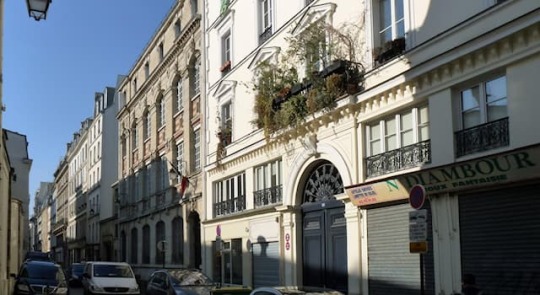
Which historical figure built 51 rue de Montmorency in Paris, which dates back to 1407?
The house of Nicolas Flamel is located at 51 rue de Montmorency in the 3rd arrondissement of Paris, France. He commissioned the house after the death of his wife Pernelle in 1397, to accommodate the homeless. The building was completed in 1407 and is potentially the oldest in Paris. There is an old inscription on the wall, which states, "We, plowmen and women living at the porch of this house, built in 1407, are requested to say every day an 'Our Father' and an 'Ave Maria' praying God that His grace forgive poor and dead sinners." Since 2008, the ground floor has been transformed into a restaurant.
Nicolas Flamel (1330-1418) was a French scribe who developed a reputation as an alchemist after his death. He is believed to have created and discovered the philosopher's stone, which gives the bearer immortality. These legendary accounts did not appear until the 17th century.
Using the wealth of his wife, who had two previous marriages, Flamel contributed financially to churches, sometimes by commissioning sculptures. Later in life, he became known for his philanthropy.
Flamel has been portrayed in popular fiction as a legendary figure who holds the key to immortality, for instance the 'Harry Potter' books and films (1997 to the 2022).
0 notes
Text
Y’know when I was a kid the fact that the first Harry Potter book had two different titles was just a fun little quirk but now that I’m older and capable of independent thought I’m just generally confused because Philosopher and Sorcerer do not mean the same thing even remotely?
0 notes
Text
Chrysalis: Chapter 12
Start Here | Prev | Next
---------------
Caelia may have had no experience with sneaking anywhere in Hogwarts, except for maybe the kitchens (though that was an open Hufflepuff secret), but she did have experience with Transfiguration.
Harry had warned her about Peeves, Filch, and Filch’s cat, Mrs. Norris, and using what she learned in McGonagall’s class, she decided that Mrs. Norris was who she would have to take out of the equation first. In a fun, safe, cat-friendly way of course. She didn’t grow up being babysat by Mrs. Figg for nothing.
Taking a couple of her spare quills, she finished writing a letter to her father as her dormmates left the common room, bidding her good night. Finally, she was alone.
Tiptoeing out of the common room and into the hallway, she glanced around, and then, setting a quill on the floor, transfigured it into a rat, which scurried away quickly. That would keep Mrs. Norris busy and her nose out of Caelia’s business.
She began to make her way down the hall by the Slytherin common room to head upstairs, but froze as she saw someone exiting Professor Snape’s office.
Draco.
He stilled at the sight of her, and his eyes widened. Quietly, he hurried towards her.
“Caelia.”
“Hi Draco,” she smiled sheepishly.
“What are you doing out here?”
I could ask you the same thing, she thought. But she was already late. “Draco, you know this is only the first time I’ve snuck out.”
“I know. So it must be something important…”
“Draco… do you trust me?”
He nodded.
“I’ll tell you everything later. I promise.”
“You don’t have to. Just… are you okay?”
She smiled. “I will be.”
The two of them parted ways, Draco to his common room and Caelia upstairs as fast as she could. She had to set another rat loose when Mrs. Norris came too close, but blessedly nothing else obstructed her path. She met Harry, Ron, and Hermione--who appeared seemingly out of nowhere--at the door in the third floor corridor, which was already ajar.
“Well, there you are,” Harry said quietly, “Snape’s already got past Fluffy.”
“Fluffy?” Caelia gasped. “That’s such a cute name, what is it that we’re facing?”
The three of them stared at her.
“Right. Nevermind. Sorry.”
Harry turned to the other three. “If you want to go back, I won’t blame you. You can take the cloak, I won’t need it now.”
Caelia frowned. “Are you serious?”
“Don’t be stupid,” Ron chimed in.
“We’re coming,” said Hermione.
Harry pushed the door open.
Caelis peered into the dark room, and flinched slightly when she heard low growls coming from the back of the room. “What is that?” She whispered.
Ron rested a hand on her shoulder. “Caelia… meet Fluffy, the three headed dog.”
“What’s that at its feet?” Hermione whispered.
“Looks like a harp,” said Ron. “Snape must have left it there.”
“It must wake up the moment you stop playing,” said Harry. “Well, here goes…”
He pulled out a short wooden flute and blew a tuneless stream of music, lulling Fluffy back to sleep.
Ron and Hermione led Caelia to a trapdoor next to the dog’s great paws.
“Want to go first, Hermione?”
“No, I don’t!”
“All right,” said Ron, gritting his teeth. He pulled open the trapdoor and he and Caelia peered inside.
“It’s pitch black,” she muttered. “Is it too risky to try Lumos?”
“I haven’t practiced that spell yet,” Hermione admitted. “But I’ve read about it in the second-year textbooks. Can you do it?”
“Yeah, my Dad taught me. Lumos,” she whispered, sending a tiny ball of light into the pitch-black hole to reveal a large mass of vines. “That looks like a pretty soft landing.”
Harry had made his way over to them, and handed the flute to Hermione for her to keep playing. “That’s good news, but just in case, I’ll go first,” he said. “If anything happens to me, don’t follow. Go straight to the owlery and send Hedwig to Dumbledore, right?”
“Right,” said Ron.
“Harry…” Caelia started. “We can go at the same time, if you like.”
He seemed to consider it for a moment, but shook his head. “It’s alright. See you in a minute,” he smiled to reassure her.
And Harry dropped into the hole, straight into the bed of vines. After a moment, he called back up to them. “It’s okay, you can jump!”
Ron went next, then Caelia, then Hermione.
They looked around. “We must be miles under the school,” said Hermione.
“Lucky this plant thing’s here, really,” said Ron.
Caelia paled.
“Lucky!” shrieked Hermione, “Look at you three!”
Harry and Caelia were wrapped up to their necks in the vines, and Ron’s legs were encased by them as well. Hermione pulled free and scrambled over to a wall.
The boys began to struggle, but Caelia remained as still as she could. If there was one thing she’d learned from Professor Sprout this year, it was that getting sent to the hospital wing with Devil’s Snare choking the life out of your wrist was not fun.
“I know what this is--” said Hermione “--it’s Devil’s Snare!”
“Hermione, can you light a fire?” Caelia gasped.
Ron’s jaw dropped. “What would that do, we’d all be caught up in it!”
“That’s how you kill it!” Hermione cried, wringing her wrists. “But--but there’s no wood!”
“HAVE YOU GONE MAD?” Ron bellowed. “ARE YOU A WITCH OR NOT?”
“Oh, right!” said Hermione, and she conjured her trademark bluebell frames, sending them through the plant, allowing Harry, Ron, and Caelia to escape.
The next room was filled with flying keys, and the door across the room was locked. Ron figured out what key they should be looking for, and the four of them mounted brooms, flying into the mass of wings keys.
Caelia’s tactic was to grab handfuls of keys and rifle through them, looking for a silver one, but Harry, being seeker, was a bit faster--he spotted the silver key with bright blue wings and the four of them dove for it so Harry could capture it.
Once unlocked, the door revealed a room filled with, of all things, chess pieces.
“Now what do we do?” Harry whispered.
“It’s obvious, isn’t it?” said Ron. “We’ve got to play our way across the room.”
Ron replaced each of the black pieces with one of them, taking the knight for himself, and expertly navigated them across the board. Caelia’s very bones shook each time a piece got knocked out, but she resolved to trust that Ron wouldn’t allow one of them to be hurt.
That is, aside from himself.
“Yes…” said Ron softly, upon observing the white, faceless queen before him. “It’s the only way… I’ve got to be taken.”
“NO!” The other three shouted.
“That’s chess!” snapped Ron. “You’ve got to make some sacrifices! I take one step forward and she’ll take me--that leaves you free to checkmate the king, Harry!”
“But--”
“Do you want to stop Snape or not?”
“Ron--”
“Look, if you don’t hurry up, he’ll already have the Stone!”
In the next moment, Ron had moved forward and was swiped off his place atop the horse--Hermione and Caelia screamed, and Harry flinched harshly--and he was knocked out, dragged onto the other side of the room by the queen.
Shaking, Harry quickly moved three spaces to the left, forcing the white king to accept defeat.
The three of them quietly moved on to the next room, groaning in disgust at the sight of a knocked-out troll, and quickly continued to a room only populated by a table full of vials. Caelia was doing everything in her power to stay calm, but nearly jumped out of her skin when two barriers of fire--one purple, one black--trapped them within the room.
Hermione took no time at all to decode the riddle, but when it came time to decide who would drink what, they all drew a bit of a blank.
“There’s three of us, and each of those bottles has barely one swallow’s worth of liquid,” said Caelia.
Harry stared intensely at the bottles. “Which one will get you back through the purple flames?”
Hermione pointed at the right bottle.
“Hermione, you drink that,” said Harry. “No, listen, get back and get Ron. Grab brooms from the flying-key room, they’ll get you out of the trapdoor and past Fluffy--go straight to the owlery and send Hedwig to Dumbledore, we need him. I might be able to hold Snape off for a while, but I’m no match for him, really.”
Hermione nodded weakly. “Wait--but then, what will Caelia do? You can’t both drink the vial to get through either fire.”
Caelia squinted. “Can’t wine put out fire?”
Hermione tilted her head. “Yes. I don’t know about magical fire, but it’s worth a try.”
Caelia nodded, and Hermione indicated the two wine vials. While Hermione went to give Harry a hug, Caelia took one of the vials over to the black fire and poured a very tiny bit over the fire, smiling weakly when she saw it begin to die down.
Going back to join them, Caelia gave Hermione a tight hug before the bushy-haired girl drank her vial and rushed back through the purple flames towards Ron.
Harry, however, was frowning. “Aren’t you going to go with her?”
Caelia shook her head amusedly. “Remember what I said? I’m not leaving you behind. Besides…” she went over to the purple flames and poured a bit of the wine over them. Nothing happened. “Apparently these are wine-proof flames. Professor Snape is very, very weird.”
Harry sighed in defeat, but drank his vial and motioned for her to follow him. She poured the two wine vials over the flames, allowing her just enough time to slip through the heat.
Harry had frozen. Caelia looked past him.
There was someone already there.
It was Quirrel.
“You!” gasped Harry. Caelia’s jaw had hit the floor.
Quirrel smiled, completely calm. “Me. I wondered whether I’d be meeting you here, Potter.”
Harry had tried to shove Caelia behind him, out of Quirrel’s view, but the so-called professor noticed.
“Well, well, well… who else do we have here?”
Caelia snapped.
Storming out from behind Harry, she made her way all the way into the room and marched straight up to Quirrel, thrusting her wand towards his throat.
“YOU!” She screamed. “YOU’RE THE ONE WHO TRIED TO KILL HARRY AT THE QUIDDITCH MATCH! YOU HAVE MADE MY BEST FRIEND’S LIFE MISERABLE FOR A YEAR! YOU DENIED MY FRIENDSHIP BRACELET! YOU HAVE WASTED THE TIME OF EVERY STUDENT IN THIS SCHOOL TRYING TO TAKE DADA, AND YOU LET IN THAT TROLL! HOW DARE YOU SIR!”
Quirrel, for a moment, seemed to retreat back into the professor they thought they’d known--fumbling helplessly for his wand as he was held and wand-point by Caelia.
“Try it, I dare you,” she snarled. “I may be a first year, but having an auror for a dad made up for having to sit through your miserable class for a whole year. Harry, go ahead and question him.”
Harry, who had only ever seen Caelia act this way on three specific occasions before, had frozen in fear. Finally coming to, he noticed the Mirror of Erised behind Quirrel and Caelia. He cleared his throat.
“Caelia, lead Quirrel to the mirror.”
Caelia grabbed Quirrel’s arm and jerked him around, keeping her wand pointed at his head.
“What do you see in the mirror?” Harry bit out. He was still trying to wrap his mind around the fact that it was not Snape standing before him.
Quirrel chuckled, and Caelia jammed her wand further into the side of his turban, causing him to flinch. “I see the stone… I am presenting it to my master… but where is it?”
Harry frowned. “Who is your master?”
Quirrel smiled once more. “Why, Lord Voldemort, of course. I used to be foolish, full of ridiculous ideas about good and evil… he showed me how wrong I was. There is no good and evil, there is only power, and those too weak to see it. I cannot fail him again…” he murmured, shuddering.
Caelia rolled her eyes. “Yeah, we get it, You-Know-Who is a really great guy--moving on!”
“What I am trying to understand is where exactly the Stone is. Is it inside the mirror?”
Caelia glanced at Harry and it was clear that all the gears were connecting in his head. Unfortunately, she made the mistake of glancing at the mirror for just a moment--she thought she saw a goat?--but Quirrel used this moment to grab ahold of her and cast her aside, causing her to slam into the stone wall--then, not a second later--
“CRUCIO!”
She screamed.
She screamed until all she saw was white. White hot pain coursed through every fiber of her being, tears poured down her face and she cried out Harry’s name.
But there was nothing Harry could do, as Quirrel forced him in front of the Mirror and he pocketed the stone.
Quirrel pushed Harry out of the way, and the distraught boy rushed over to Caelia, who was still violently shaking and crying.
“Let me speak to him… face-to-face…”
Harry was frozen next to Caelia, who had finally begun to calm, but the two of them trembled with fear as Quirrel unwrapped his turban to reveal, quite literally, the most horrifying face they had ever seen--chalk white, a nose replaced by snake-like slits, and deep, soulless red eyes that glinted in their direction. Caelia screamed once more.
She had lost all concept of what was happening around her. Voldemort--Quirrell was advancing upon Harry, who was shouting angrily--he had run away, the two-faced man in pursuit--Harry grabbed Quirrel, who screamed--Voldemort was screaming just as loud and desperately, which later caused Caelia just how pathetic of a villain he was, considering how often he lost to a literal child.
Eventually, all the screaming came to an abrupt halt--until Caelia came to and saw Quirrel’s dead body, devoid of Voldemort’s face, and Harry’s unconscious one beside her.
It didn’t take much longer for Professor Dumbledore to rush into the room, followed by McGonagall, Snape, Ron, and Hermione--the latter of whom screamed as well. It was all getting to be too much for Caelia’s head to take--she remembered stuttering worse than Quirrel while trying to explain what happened--the next thing she knew she was in a very soft bed and she just couldn’t take it anymore, falling asleep while tears streamed down her cheeks.
#chrysalis#harry potter#Harry Potter fanfiction#fanfiction#Hufflepuff#writer#writing#sorcerer's stone#professor quirrel#mirror of erised#voldemort#the golden trio#nicolas flamel#harry james potter#fanfic writer
1 note
·
View note